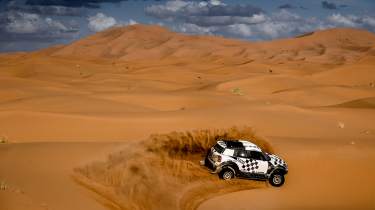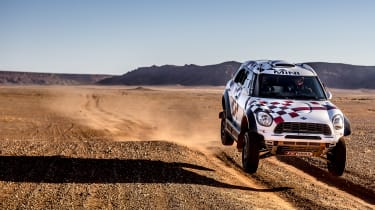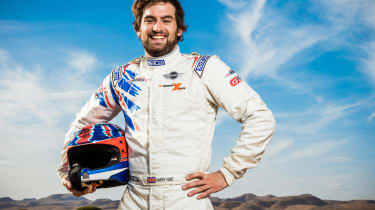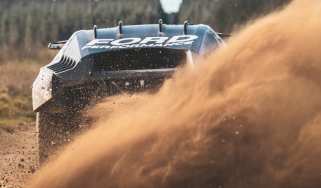Dakar Rally 2016 blog - part 4 - Dakar 2016 - day 3
Daily updates from the incredible 9596km race
After a false start on Sunday, the rally finally got going on Monday morning. The persistent rain that led to the cancellation of the previous day’s action was replaced by the kind of searing, oppressive sunshine that’ll burn a pasty English boy’s skin in five minutes flat. Ouch.
We got to Monday’s stage in time to watch the field of motorbikes pass through and I can now confirm that anybody who embarks upon this event with only two wheels is certifiable. The riders seem to be in a constant state of almost falling off.
We did witness a couple of crashes, actually. One rider was thrown so violently from his high-siding bike that he disappeared into the weeds. Slightly morbidly a cheer did go up from the crowd with each crash, but the cheer and applause that rang around when the riders got going again was much louder on both occasions. I think there’s a really deep respect for all the competitors among the spectators.
Late in the morning the cars started to appear. Rather like yesterday’s cancelled stage Monday’s test was much more like a typical WRC gravel stage than the sort of open, undefined expanse that springs to mind when we think of the Dakar. The cars were slightly out of their comfort zone on this tight, twisty track and I would still love to watch them soaring over dunes and blazing across salt flats.
What really stands out is the variety of machines. The Dakar regulations give the car designers two options – four-wheel drive and limited suspension travel, or two-wheel drive and all the suspension travel you can dream of. That’s why the Peugeot 2008 DKR looks like a hybrid of a dune buggy and a giant insect and the Mini All4 Racing looks like a slightly jacked up rally car.
Beyond that there were pick-ups and buggies and big 4x4s that looked as though they’d taken a wrong turn on the school run. It was superb. Variety, I think, is one thing that’s sorely missing from the WRC.
The enormous trucks were a sight to behold, too. I’d expected them to lumber along lazily like, well, trucks, but they actually looked really athletic and nimble, given their size. If my local council bought a few of them it could do hourly bin collections.
I left the stage eight hours ago but I’ve only just been able to get online to check the standings. A Dakar rookie by the name of Loeb appears to be leading. Good for him. I do love an underdog. (I’ve listed the top-ten at the bottom of the article).
Briton Harry Hunt sits in a very creditable 17th overall after the first timed stage, which was some 387km long. That’s an impressive performance given this is his first Dakar. Here’s what Harry had to say when I caught up with him.
DP: The longest stage of the rally is 542km. Can you feel your concentration waning in the longer stages on events such as the Dakar?
HH: I sometimes can. Not on the twisty or bumpy stuff, but on the really expansive sections, yeah. You can afford to let your concentration dip a little on those bits…although you never know what’s coming up so you can’t switch off completely.
DP: Do you prefer the twisty stuff or the wide, open sections?
HH: I like them both. The open stuff makes for quite a nice break. If you’re in a really tight and twisty section, 100 to 150km, and you come out and the navigator says ‘20km straight’, it’s nice. You have some water, an energy bar and it’s a good rest period.
DP: Do you get the same buzz from this sort of rallying as you do stage rallying?
HH: When you get to the end of the stage you get more of a buzz in this. You’re nowhere near the limit, though. In stage rallying you’re on the edge of breaking grip and traction the whole time, trying to find that tenth of a second, but here you’re at 80 per cent for so many hours. When you get to the end of a long stage it’s such a thrill. I love it.
DP: What do you think will be your favourite terrain?
HH: I really like the dunes. Then it’s the fast gravel roads. I don’t have time to enjoy the scenery but the thrill of driving and sliding around while looking out at the mountains is special. I think Bolivia will be amazing. We’ll go up to 4900 metres. A lot of drivers were sick last year and they only went up to 3800 metres.
DP: What are you ambitions for your first Dakar?
HH: Just get to the end. Obviously I’d love in four, five, six years to win it. Winning the Dakar would be the best thing in the world.
Standings after SS2
- Sebastien Loeb, Peugeot
- Stephane Peterhansel, Peugeot
- Giniel De Villiers, Toyota
- Mikko Hirvonen, Mini
- Leeroy Poulter, Toyota
- Vladimir Vasilyev, Toyota
- Bernhard Ten Brinke, Toyota
- Cyril Despres, Peugeot
- Nasser Al-Attiyah, Mini
- 10. Martin Prokop, Toyota






